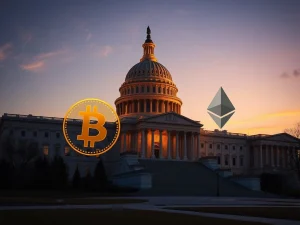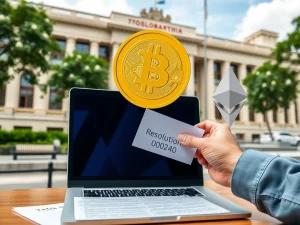El Salvador Bitcoin Strategy: Unwavering Accumulation Despite IMF Deal

El Salvador, the first nation to adopt Bitcoin as legal tender, continues to make headlines with its unique economic strategy. The country has persisted with its daily Bitcoin purchases, adding 240 BTC to its treasury since late 2024, a move that comes after reaching a significant $1.4 billion loan agreement with the International Monetary Fund (IMF). This continued acquisition strategy sparks questions about the nation’s commitments and its long-term vision for digital assets.
Navigating the IMF Agreement on Bitcoin Accumulation
A key point of discussion is El Salvador’s $1.4 billion loan deal with the IMF, finalized in December 2024. Reports indicated that this agreement included provisions discouraging the country from further public Bitcoin accumulation and potentially required dropping its legal tender status. Despite this, the government’s treasury wallet now holds 6,209 BTC, reflecting the purchase of 240 BTC since the December 19, 2024, announcement of the IMF deal, according to data from the El Salvador Bitcoin Office.
President Nayib Bukele first announced the strategy of buying one Bitcoin per day in 2022. This consistent approach appears to be ongoing, even after the IMF negotiations. The perceived conflict between the agreement’s terms and the country’s actions has led to various interpretations.
How is El Salvador Compliant?
Interestingly, when questioned about El Salvador’s continued purchases, the IMF’s Western Hemisphere Department director, Rodrigo Valdes, stated the country remains technically compliant. Valdes remarked that El Salvador “continues to comply with their commitment of non-accumulation of Bitcoin by the overall fiscal sector.”
Experts suggest this technical compliance might stem from a flexible interpretation of the agreement. Anndy Lian, an author and blockchain adviser, noted that this “flexible interpretation” could mean purchases involve non-public sector entities or are reclassified assets. This alternative approach allows El Salvador to maintain its Bitcoin-friendly image while securing crucial IMF funding.
Impact on Crypto Remittances
While El Salvador’s Bitcoin accumulation strategy continues, the flow of crypto remittances into the country saw a significant drop in the first quarter of 2025. Data from the Central Reserve Bank indicates that cryptocurrency transfers to Salvadoran wallets fell by 44.5% compared to the same period in 2024. Crypto remittances amounted to $16 million in Q1 2025, representing just 0.52% of total remittances, down from $28.3 million (1.08%) in Q1 2024.
This decline in crypto remittances presents a contrasting trend to the government’s persistent Bitcoin buying, suggesting that while the state remains committed to its Bitcoin reserve strategy under President Nayib Bukele, the practical use of crypto for everyday transfers by the population may be facing challenges or shifting patterns.
Summary
El Salvador continues its daily Bitcoin purchases, adding 240 BTC since December 2024, despite a loan agreement with the IMF that seemingly discouraged further Bitcoin accumulation. The country appears to be navigating the terms of the IMF agreement through a technical or flexible interpretation, maintaining its commitment to building a Bitcoin reserve. However, this state-level strategy contrasts with a notable decline in crypto remittances received by the population in early 2025. The situation highlights El Salvador’s unique position in the global financial landscape, balancing international financial agreements with its bold adoption of Bitcoin.










